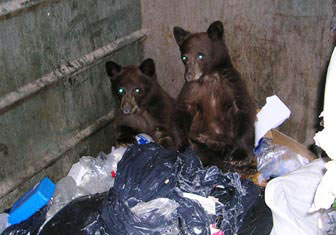Bears becoming “couch potatoes” thanks to dumpsters
mongabay.com
October 18, 2006
 Looking like two kids with their hands caught in a cookie jar, two male black bear cubs were recently trapped inside a dumpster at the Zephyr Cove Campground in Lake Tahoe, Nevada when its “bear-proofed” lid, which was left open, had closed and kept the bears in instead of out. The cubs’ agitated mother, along with a third male cub in tow, began to guard various dumpsters on site from passers-by, prompting a call to scientists at the Wildlife Conservation Society and Nevada Division of Wildlife (NDOW). After being tranquilized, the entire family of “dumpster-divers” was released together in a mountain region near the campsite. Mama Bear was fitted with a radio-collar so that her future movements can be tracked by scientists, who hope the family now sticks to a bear’s natural diet that consists mostly of grasses, berries, pine nuts, and other vegetation in western Nevada. Caption credit: WCS. Photo credit: Jon Beckmann/WCS. |
Research by the Bronx Zoo-based Wildlife Conservation Society (WCS) has found that bears living near urban areas are becoming “couch potatoes”, a third less active and weighing up to thirty percent more than bears living in more wild areas. Bears are apparently forsaking their natural food sources and spending more time foraging in dumpsters.
The study, published three years ago the Journal of Zoology, “helped prompt legislation requiring bear resistant containers be used for human trash” in an effort to “discourage bears from feeding on garbage… and to eliminate the potential for bear/human conflict” according to a news release from WCS.